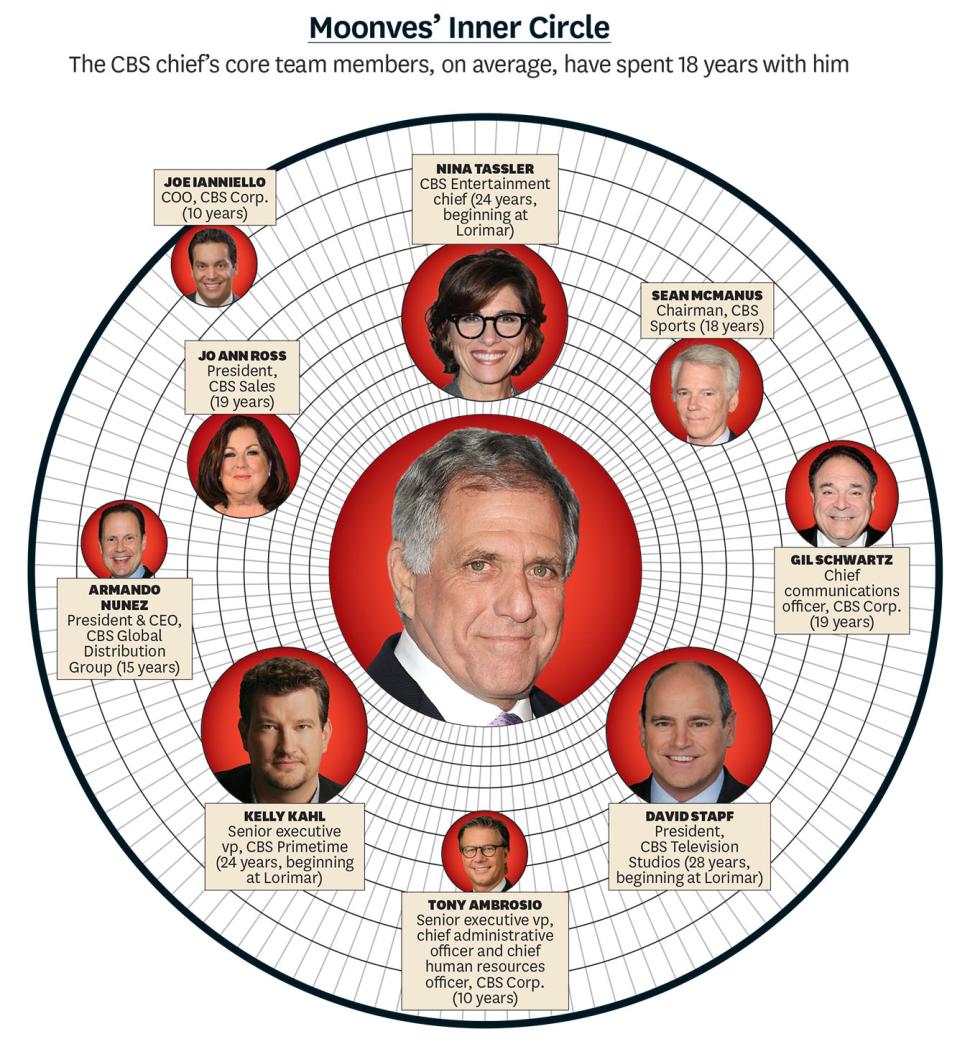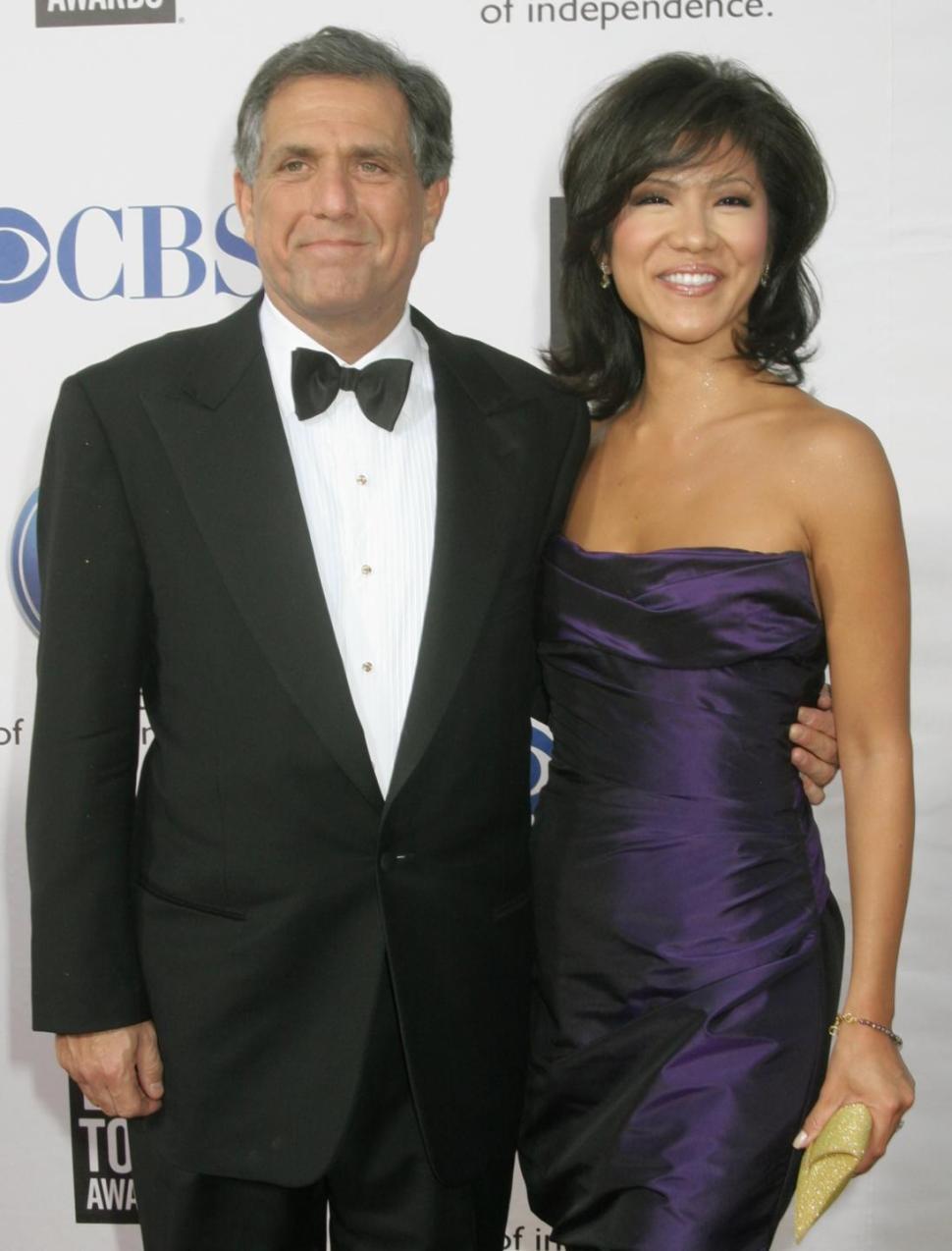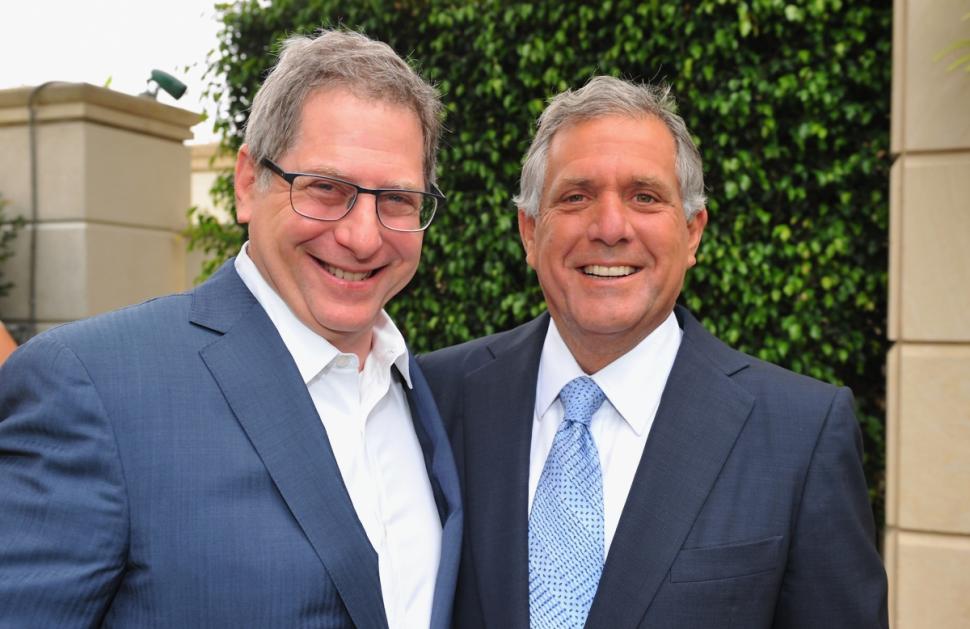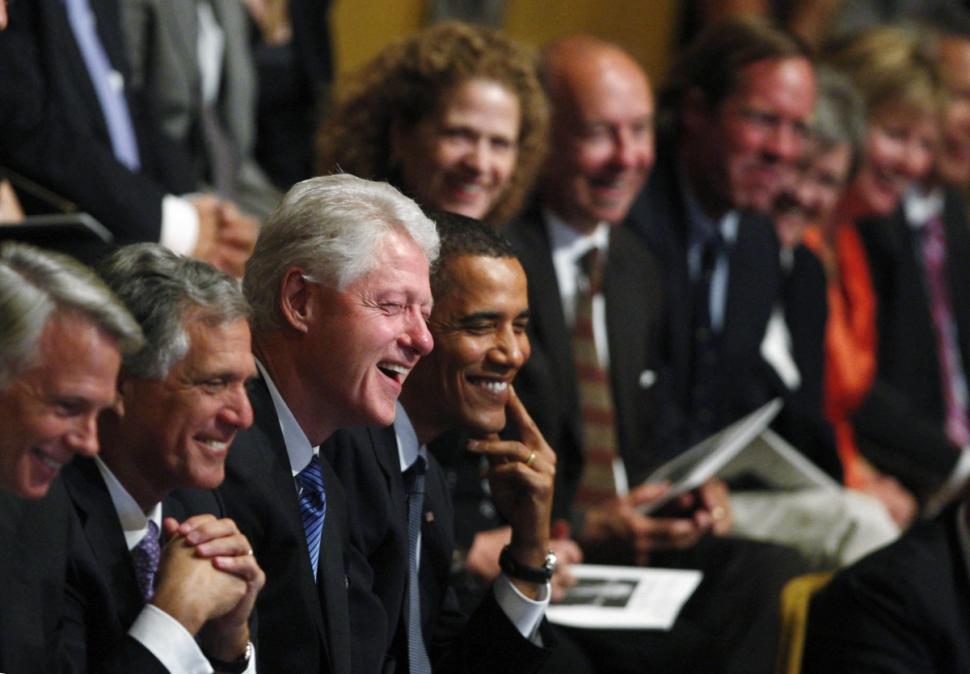CBS’ Leslie Moonves: Wall Street Hero, ‘Pushover’ at Home, Future Ambassador?
This report first appeared in the Oct. 3 issue of The Hollywood Reporter magazine.
Two and a half years ago, Leslie Moonves was sitting at midtown Manhattan’s Composition Box Theatre for a production of “One Man, Two Guvnors,” laughing so hard his sides ached.
Onstage was an English comedian whom the CBS chief executive had never heard of before: James Corden, a now-36-year-ancient with a résumé that includes a screwball mix of prose, acting, singing, dancing and emceeing. Moonves loved what he saw that evening, and later online, and immediately was conspiring to bring Corden to his network. He started by lobbying Bob Boyett, one of the play’s producers whom he knew from his days at Lorimar during the late 1980s.
“The guy was just so appealing,” says Moonves, now seated in his 35th-floor corner office at CBS’ Black Rock headquarters in New York, where he spends about a third of his time. He plotting he had snagged the comic to do a sitcom this past season, but when that deal didn’t come together, Moonves wouldn’t let up. In May, he and his entertainment chairman, Nina Tassler, had Corden come by Black Rock to discuss the possibility of late night. They were dazzled by his pitch, which highlighted his unique brand of comedy — “a cross between Fred Astaire and Jack Black,” says Tassler — and eschewed the customary late-night riffing on current events. That he’d be a total unknown to most U.S. viewers was of little concern to Moonves, who saw the potential for a distinctive sensibility that could make the franchise a part of the conversation in the way that micro-niche predecessor Craig Ferguson did not. On Sept. 8, the news broke: Corden will be the new host of “The Late Late Show.”
Read more ‘Madam Secretary’: 5 Things to Know About CBS’ Political Drama
When I question Moonves, 64, why someone of his stature — the CEO of a $ 30 billion company who took home a staggering $ 67 million in pay in 2013 — is out there scouting new late-night talent along with other hands-on creative tasks such as reading scripts and watching casting tapes, he says without hesitation, “Because I still like it.” What he doesn’t need to say but is evident from his track record — CBS is the most-watched network for 11 of the past 12 seasons and recently earned 11 Primetime Emmys, second only to HBO — is that he’s better at it than almost anyone else. “He’s the man with a platinum gut,” says DreamWorks Animation CEO and longtime friend Jeffrey Katzenberg, who tried to poach Moonves more than once in his career. “He has an instinct about the audience — who they are, what they want and how to entertain them — and he has done it with a level of success and reliability that is almost unprecedented.”
What becomes clear as I spend time with the gregarious executive over multiple days in August is that he is a vestige of an earlier era when showmen, rather than MBAs, ran the entertainment industry. He has no pretenses about his accessibility either, as willing to chat up a TMZ cameraman as he is any of the 17,000-plus CBS employees who covet his attention. And though questions loom about his future in a post-Sumner Redstone organization, a source of splendid stress among his many disciples, he’s going as full bore as ever. Those closest to him suggest it’s a passion for the game — and the clout that comes with winning at it — that fuels the onetime actor, who can intimidate as effortlessly as he can charm. Now, as the broadcast industry of which he is the most vociferous supporter is being threatened by technological advances and changing viewer habits, Moonves is fighting heartlessly to adapt with it, championing a second revenue spill that’s poised to bring his network $ 2 billion a year from affiliate fees and cutting in-season deals with Amazon and Netflix that he would have run screaming from only a few years ago.
“There are two things about Les: He’s con- stantly curious, and he’s ridiculously competitive,” says WME co-CEO Ari Emanuel, who considers Moonves a friend and mentor. “We’ll go to Augusta together [for the Masters], and he’ll sit there and quote you ratings and shares and seven-day numbers. It’s crazy that he still gives a shit, but that’s just who he is.”
•••
Heading into the fall season, his 20th at CBS and 33rd in the business, Moonves had been feeling more bullish than usual. After all, he and his CBS Sports chairman, Sean McManus, had negotiated a $ 275 million deal for the rights to “Thursday Night Football,” which not only would provide the ultimate launchpad for new series but also could generate a hefty $ 500,000 for 30-second spots. Then came the early September news that the NFL had severely botched the domestic violence case of Baltimore Ravens running back Ray Rice, and a high-profile opener — the Ravens hosting the Pittsburgh Steelers — became a test in quandary management.

Moonves acted as he often does: calmly and decisively. On the ground in Baltimore, he and McManus scrapped a song by Rihanna (herself once battered) and celebratory intro and went forward with plans for sportscaster James Brown to deliver a powerful pregame commentary and recap of “CBS This Morning” anchor Norah O’Donnell‘s unsparing interview with NFL commissioner Roger Goodell. From the further than, it appeared Moonves had averted a public relations disaster, with outlets including The Hollywood Reporter praising the network’s handling of the events. The following morning, Nielsen reported that a whopping 21 million viewers had tuned in. Although the CBS chief acknowledges “a couple of sponsors” questioned to have ads shifted (one to a different part of the game; the other to another game), he downplays the impact. “We filled up those spots in about five seconds,” he says, brushing off the potential for continued backlash as additional cases of domestic violence surface. “As a television product, the NFL is still very valuable.”
If all goes as Moonves anticipates, it’ll be the second foremost headache he will have successfully staved off this year. The first came with the expertly managed handoff between late-night hosts David Letterman and Stephen Colbert, who’s expected to start as host of “Late Show” in fall 2015. Moonves says he and Letterman had been talking for some time about the right point at which to hang up the show. “We’d obviously seen the errors of some of the other people in handling these situations, and that thought was so abhorrent to Dave and to me,” he says, referring to NBC’s series of bumbled wand tosses. Together, he and his longtime host decided to wait in anticipation of after the noise from Jay Leno‘s departure had died down. On April 3, Letterman got to choreograph his own sendoff, announcing on air that this current season would be his last.
Read more Fall TV 2014: The Full Schedule
Dozens of comics reached out about filling the role, including reps for Chris Rock, but Moonves and Tassler had their hearts set on Colbert, whose Comedy Central access often outrates its broadcast competition. Within a week, they had very peacefully hammered out a deal, the finishing touches of which Moonves finalized from an NCAA Final Four game in Dallas. On April 10, CBS sent out a press release announcing the news. “I think Colbert is going to be the conscience of America,” says Moonves, confident that his new host, who plans to shed his faux-conservative assumed role, will fill the Letterman void. “Jay may have gotten higher numbers, but when 9/11 happened, people tuned into David.”
Nearer term, Moonves is focused on regaining CBS’ primetime dominance. Coming off a particularly rough season in which the network fell to No. 3 with younger viewers (it remained No. 1 in total viewers and adults 25-to-54), he suggests he’s not as worried about the competition as he was last year. “When I saw ‘The Blacklist,’ I said, ‘This is going to be distress,’ ” he recalls of the top-rated James Spader drama on NBC. “When it killed our show ['Hostages'], that didn’t feel excellent. … The executives who say, ‘Oh it didn’t matter,’ that’s bull.”
His new offerings include a broad family comedy, “The McCarthys,” and original iterations of NCIS and CSI. If it sounds like more of the same, that’s by design. Critics may slam CBS’ programming for being too formulaic — “It pretty much programs its network and runs its business as if it were still the 1990s,” wrote James Poniewozik in “Time” — but the formula has worked for Moonves. While his premium cable outlet Showtime supplies the cachet with such shows as “Homeland” and “Masters of Sex,” his flagship network consistently delivers billion-dollar franchises, including those staples NCIS and CSI. The former recently supplanted the latter as the most-watched show in the world —and CBS owns both.
But rather than sit back and hope viewers show up as he once did, Moonves has been aggressive about selling his programming on different platforms — on air and online — around the world, making new revenue sources and weaning his business from its dependence on fickle advertisers. And he’s shrewdly used his growing stable of live events, which include sports (NFL and SEC football, PGA golf) and award shows (Tonys, Grammys), along with returning hits to promote his new fare to the widest audience possible. Wall Road has satisfied the strategy: In the five-year period ending in 2013, CBS’ stock fee appreciated 678 percent, significantly exceeding that of each of its media peers and beating its next-door competitor (Viacom) by more than 300 percentage points.
•••
As premiere week approaches, Moonves sits with two of his creative executives — studio boss David Stapf and CBS current programming chief Glenn Geller — in a room off of his Studio City office to hear what’s in store. “Whaddya got?” he says, rubbing his tanned hands together with a childlike excitement on a morning in late August. Geller throws out the first stunt with a mix of enthusiasm and angst: The ladies of daytime chat show “The Talk” — including Moonves’ wife, Julie Chen — each will make cameos on a primetime show. “Like that,” says the CBS chief, the wheels in his head already turning about a potential CBS-owned “Entertainment Tonight” tie-in.
 Hollywood Reporter
Hollywood Reporter There’s palpable relief in the room, and Geller continues: The NCIS stars will appear on the New Orleans spinoff; CSI: Cyber lead Patricia Arquette will drop by the franchise original. Each thought scores the endorsement of Moonves, part impassioned cheerleader, part demanding coach. Before long, he’s pitching his own thoughts: Have they considered having Justin Bieber stop by freshman drama “Scorpion,” which his administrator Scooter Braun produces? Or maybe one of the other musical acts on Braun’s roster? He’s keen to hear how the footage from the new crop is coming in, too. Is Tea Leoni‘s “Madam Secretary” skewing more family or political? And can he get his hands on the latest cut of “NCIS: New Orleans”?
Looming over his right shoulder as he speaks is a framed poster of “The Godfather,” his all-time favorite movie because, he’ll tell me later, “It’s about family, business, competition and loyalty.” When I state the evident — that these are all themes that resonate in his life — he lets out a hearty laugh and adds, “And there are consequences to behavior.” I do again the line to Chen, his wife of 10 years and host of CBS’ “Huge Brother” in addition to The Talk, and she howls. “If you cross him, he doesn’t forget,” she says. “You’re dead to him.”
Qualities that historically have rankled the CBS chief include dishonesty, disloyalty and a desire for the focus, with insiders noting that the men who have thrived under Moonves, a classic alpha male, tend to be egoless. (The women often have had larger personalities.) He has a hard time firing people, even those whom he perceives to have wronged him, but is said to have an simpler time freezing them out. And as his wife warned, those who have landed on his terrible side have found it almost impossible to recover. Remember Terry Botwick, the network’s high-powered head of current programming and specials in the late 1990s before being vanquished by Moonves? Or how about CBS Productions’ mid-1990s chief, Andy Hill, for whom a Google search today turns up a low-budget site to book him for speaking gigs?
Many more remain in Moonves’ good graces and are satisfied with fierce loyalty. In fact, several core members of his team have been with him for more than two decades, including Tassler, Stapf and scheduler Kelly Kahl, who followed him from Lorimar. And though he can be very hands-on — “There’s no detail too small for him,” says one employee — his executives remain faithful because they feel cared for and because they like being on a winning team. Tassler likens his leadership style to that of a good parent. “It’s not so much dread of rage; it’s dread of disappointment,” she says. “You don’t want to disappoint someone who sets such a high standard for himself and for us.”
With family, that tough guy disappears. “Julie’s the tyrant,” he says of the setup with their 5-year-ancient son, Charlie. “I’m more of a softie than I’d like to let people believe.” His daughter, Sara, from his first marriage, says it was no different when she and her two brothers were growing up. “He was beyond doubt a pushover,” she laughs, recounting trips to New York where she’d persuade him to take her shopping. Now 29 and effective in New York as an editor at Rage, she discussion to her dad every day and still is counted on to watch the CBS pilots and weigh in, just as she did when she was a kid. “And there hasn’t been a release year where he doesn’t want me to come to the upfronts,” she adds, “to the point where I’m like, ‘Dad, I’ve been …’ And he’ll say: ‘Please come. You have to see these new shows.’ “
He’s that much more caught up with Charlie, a commentary on both his position and his life stage. CBS employees catch glimpses of his softer side at Halloween, when their boss arrives in costume with his son. Last year, Moonves was dressed as Captain Hook, courtesy of the CBS costume department, with Chen as Wendy and Charlie as Peter Pan. At home, the youngest Moonves makes a leisure activity of re-enacting his favorite movies and shows, and his father is often, and willingly, roped in. Since considering “Jersey Boys,” for occasion, he likes playing Frankie and tasking Moonves with one of the other Jersey boys. “Charlie will want Leslie to dance, but he won’t allow him to sing because Leslie will want to take over — that’s the hot dog in my husband,” jokes Chen. “Charlie will be like, ‘No, no, no. Only I sing,’ and Leslie will be like, ‘OK!’ — like a trained puppy dog.”
•••
It’s perhaps the only arena in which Moonves rolls over. His competitive drive extends to the golf course, the poker desk and, according to Chen, family get-togethers.
“We’ll play charades at our family gatherings, and literally there have been cousins or in-laws whom Leslie will seriously deliberate dumping from the guest list the next year because they were terrible at charades and made his team lose,” she says, adding that she and her husband are competitive with each additional, too, making silly bets on a regular basis. “It’s the same $ 100 bill that goes back and into the world, and even when I prove to him he’s incorrect, he’s still angling and trying to argue why he’s not really incorrect.”
 TINA FINEBERG/AP ‘When Leslie first fell in like with me, he said, “You know why I like you, Jules? Because I don’t impress you.” And I said, “You do impress me; I’m just not blowing smoke up your butt like everybody else,” ‘ says Chen, Moonves’ wife of 10 years.
TINA FINEBERG/AP ‘When Leslie first fell in like with me, he said, “You know why I like you, Jules? Because I don’t impress you.” And I said, “You do impress me; I’m just not blowing smoke up your butt like everybody else,” ‘ says Chen, Moonves’ wife of 10 years. Moonves’s younger brother, Jon, a top Hollywood attorney who represents Ray Romano and Chen, suggests he comes by that competitiveness genetically. Growing up in Long Island’s Valley Spill, he’d watch his gas rank title-holder father play in a competitive league for softball, among other sports, and he nurtured a similar passion in his three children. “He would never let us win as kids. It was always, ‘You’ve got to earn it,’ ” says Jon Moonves. Although their dad is now 93, he hasn’t lost that edge. At a recent family wedding, he challenged Jon to a game of pingpong and won.
Read more Fall TV: How the New Shows Landed Their Stars
As a child, the CBS chief was a jock, too, excelling at baseball, football and tennis. And though he and his mother, a nurse, took regular outings to the theater, he didn’t embrace his own acting talents in anticipation of he got to Bucknell, where he performed in an experimental theater production of “The Serpent” as well as other plays. After graduating in 1971, he started studying at Sandy Meisner‘s prestigious Neighborhood Playhouse in New York and landed parts on such TV shows as “The Six Million Dollar Man” and “Gun.” But when he found himself doing considerably more bartending than acting — part-time at Tavern on the Green, longtime home of the CBS upfront have fun, and later at the Improv in Los Angeles when Letterman and Leno were coming up — he knew he had to reassess.
It was Warren Littlefield, then an NBC development executive, who helped Moonves score his first job in TV development with “Smothers Brothers” producer Saul Ilson in 1981. “I probably said something like, ‘Don’t f— this up because I’ve kicked the door open,’ ” laughs Littlefield. That gig led to another at Fox and later Lorimar, where Moonves shot up the corporate ladder before the company was bought by Warner Bros. for $ 1.2 billion in 1989. Moonves’ legendary run as Warner Bros. TV studio chief culminated with the 1994 launch of Friends and ER, both on NBC. “We were on top of the world. We had like 23 network shows,” he says, before his tone changes: “And then I came to CBS.”
The go existing more power and a larger purview, but the network was lagging in third place when he arrived in 1995. “The fact that we were in last place killed me,” says Moonves. He was as horrified by CBS’ ancient-fogey reputation as he was by the team’s work ethic; on his first Friday on the job, he was shocked to find the office three-quarters empty. “I wrote this email to every employee at CBS that said, ‘I’m sure at ABC and NBC at 3:30 p.m. on a Friday afternoon people are still effective. Next Friday afternoon, I’m going to walk around the office building and we’ll see if things are uncommon,’ ” he says. That got people’s attention — not just at CBS but throughout the industry.
“They were in last place, and unknown was even bothered,” he says, still sounding incredulous two decades later. To this day, Moonves is known for his own formidable work ethic, arriving at the office by 8 a.m. and regularly sending emails several hours before that. He continues, louder now: “If you’re in the television business, you better be a little bit competitive. You better say, ‘Gee, I want that script more than the other networks.’ If there’s a lack of caring about winning, you’re not going to win.”
•••
What happened next is the stuff of Moonves’ legacy. In less than a decade, he had transformed CBS into the No. 1 network, with the help of the NFL and the one-two punch of “Survivor” and “CSI,” and later its spinoffs. Though his tastes skew more toward “Game of Thrones” and “The Sopranos,” he’d latched onto a winning formula of accessible programs, appealing in their predictability. “We knew the game had changed when Les went to CBS,” says Littlefield, then-chief of NBC, who recalls putting up billboards for his hits across the road from CBS to get under his competitor’s skin.
By the time CBS and Viacom split in early 2006 — a strategic go by Redstone to unlock value — Moonves was named CEO of CBS Corp. He had no formal training in matters of Wall Road but found he learned quickly. When I meet up with him at an investor dinner at Craft’s Century City rank in late August, he’s as comfortable talking about the recent wave of media mergers as he would be his fall casting choices. And it’s the success he’s had on the business side that has most impressed peers like Barry Diller. “Coming from where he came from, the number of people who have been able to master corporate life at that level is extremely rare,” says the IAC chairman. “He has as perfect pitch running the company as he does in programming.”
 Alberto E. Rodriguez/Getty Images ‘Leslie has always been the cool older brother,’ says Jon Moonves, who spends his Sunday afternoons with extended family at his older brother’s Beverly Hills home.
Alberto E. Rodriguez/Getty Images ‘Leslie has always been the cool older brother,’ says Jon Moonves, who spends his Sunday afternoons with extended family at his older brother’s Beverly Hills home. Which is not to say Moonves’ run has been devoid of headaches. Amid a $ 500 million breach of contract lawsuit, Howard Stern particularly went on CBS’ “Late Show” wearing an “I Despise Les Moonves” T-shirt; after being tossed off “Two and a Half Men,” Charlie Sheen took to the web and called him “Les Than Goonves”: “Part scoundrel, part my hair to side.” There have been challenged divisions like CBS Films — “I think there’s a much greater upside in the television business, and I like it a lot more,” he says — and some high-profile bets gone incorrect. Among them: the 2006 choice to “blow up” the then-stodgy news group following Dan Rather‘s messy ouster by hiring Katie Couric. The $ 15 million-a-year plot backfired. “She tried very hard, but it just didn’t work,” Moonves says dismissively. Scott Pelley, who replaced her in 2011, has proved a safer (and cheaper) play, but his ratings — up 12 percent year-over-year — still lag behind ABC and NBC.
More recently, there was the public battle over TV-over-the-web service Aereo (CBS and broadcasters won at the Supreme Court), a prolonged tiff with Time Warner Cable and, of course, the Lara Logan saga at “60 Minutes.” While the latter remains the news arm’s crown jewel, it was tarnished late last year when it aired an erroneous Benghazi report that relied on Logan’s now-discredited interview with security service provider Dylan Davies. The choice to suspend Logan rather than fire her was handled by the news division, though Moonves says he was caught up and was “fine” with it.
“It was a mistake that was acknowledged,” he says, “and we’ve went on.” He refutes a damning May 2014 article about Logan in New York magazine in which writer Joe Hagan attributed her rise at 60 to Moonves’ enthusiasm for her. “I had one meeting alone with Lara in this office early on,” he says, shaking his head. “Clearly that report had a little bit of an agenda.”
•••
When I join Moonves on an August morning in his Black Rock office, once used by the original father of broadcasting, William S. Paley, I see another side to him: the political junkie.
Dressed in his Manhattan uniform — black suit, bold tie — he settles in beside his boyish news head, David Rhodes, 40, who has come armed with polling data for the November elections. The two huddle over an iPad as Rhodes walks his boss through a mock-up of the 24-hour digital news network, CBS’ answer to CNN, which they’re hoping to launch in October. (Since Time Warner rebuffed 21st Century Fox’s acquisition attempt this summer, buying a spun-off CNN no longer is on the desk.) They go over potential titles and the plot for on-air talent, which will skew younger and more social media savvy than those fronting the network’s current news shows. CBS correspondents Elaine Quijano and Jeff Glor will be among the anchors, Rhodes tells him, noting that there will be more names coming. Moonves, leaning forward, voice booming, likes what he sees.
But his excitement ticks up another notch when the conversation turns to the midterm elections. Holding the tracking figures in his hand, he peppers the news executive with questions about the hottest races and the impact certain results would have on Wall Road. Moonves doesn’t have all the answers in this setting as he seems to in L.A., and he’s keen to know more. Soon, he and Rhodes are swapping tales and political gossip, with Moonves — a lifelong Democrat who has a framed photograph of him with Presidents Obama and Clinton in both his New York and L.A. offices — admitting he has become friendly with New Jersey Gov. Chris Christie through the Allen & Co. conference in Sun Valley, Idaho.
Later, Moonves tells me that he’s been flirting for some time with the thought of venturing into the political arena himself, though the plotting of really running for office repels him. It’s a subject he and pal Robert Iger of Disney, whose political aspirations have garnered considerably more ink, have discussed. “Bob would be splendid,” he says, “but I said to him, ‘Bob, do you really want to have your picture on the front page of the newspapers every day?’ And by the way, look at Mike Bloomberg; he was out seven nights a week at five events a night.”
More appealing is the path taken by Moonves buddy John Emerson, who made his fortune at investment firm Hub Group before being tapped as ambassador to Germany in 2013. Although Moonves stresses he never was made a formal offer, he and Bill Clinton had talked about the possibility of Moonves becoming the ambassador to Spain during his administration but the timing wasn’t right. “You have to be very rich to be an ambassador. I wasn’t rich then,” he says, adding: “[Emerson's] doing a sensational job. So, you know, maybe? Who knows.”
 Jim Young/REUTERS Moonves keeps a picture of himself seated beside Head Clinton and Head Obama at Walter Cronkite’s memorial in his New York and L.A. offices.
Jim Young/REUTERS Moonves keeps a picture of himself seated beside Head Clinton and Head Obama at Walter Cronkite’s memorial in his New York and L.A. offices. I see this talk of the future as an ideal opening for a question about succession at CBS. And as far as I can tell, it’s the only one that pushes the absolutely confident CEO ever so slightly out of his comfort zone. Some social class: When Moonves extended his contract through 2017 two years ago, he did so with provisions that he’d report to a board after Redstone’s death — and should anyone interfere with that board, he could walk away with a stout check. So long as Redstone is alive, he controls CBS and Viacom through his National Amusements; but when the 91-year-ancient is gone, a trust will take upon yourself control of his voting shares. And though it’s not publicly known who’s caught up in that trust, The Hollywood Reporter Leslie Moonves on the October cover of The Hollywood Reporter.
Late Show, 2.0
In a bid to be a larger part of the late-night conversation, Moonves is putting his money on two significantly younger, Twitter-savvy hosts — only one of whom you know.
24-Hour News
Moonves didn’t get his shot at CNN, so his news division will look to roll out a 24-hour digital news network, which will count Elaine Quijano among its anchors, ahead of the midterm elections.
Acquisitions?
Having spun off the outdoor business valued at $ 6 billion, Moonves says he has “dry powder.” Still, CBS doesn’t have Disney’s deep pockets to buy a Maker Studios, so they’ll “do those sorts of things homegrown.”
This report first appeared in the Oct. 3 issue of The Hollywood Reporter magazine.












